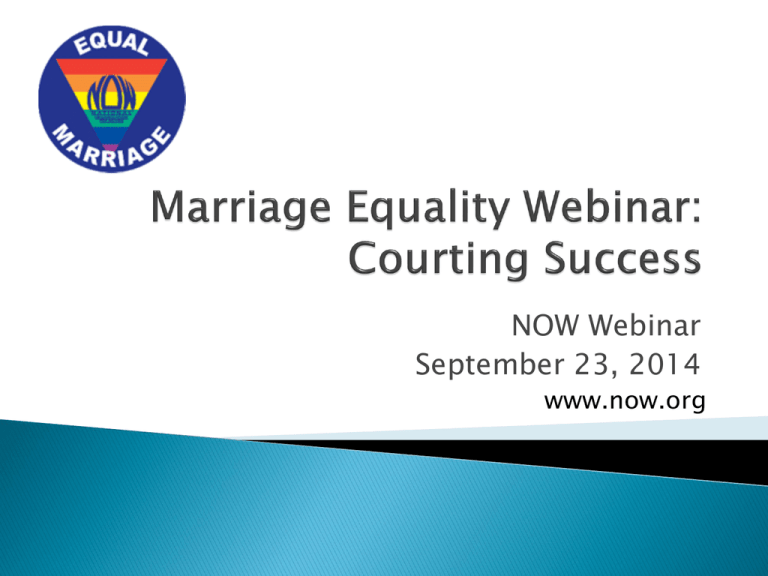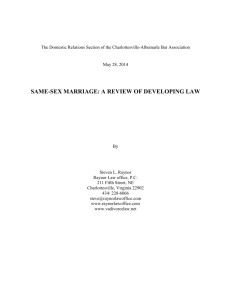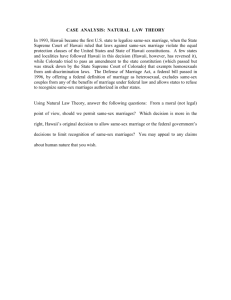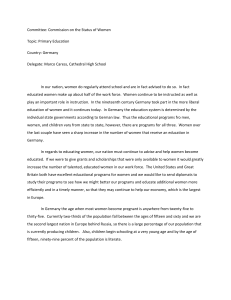Lessons Learned: The Marriage Equality Movement
advertisement

NOW Webinar September 23, 2014 www.now.org Bonnie Grabenhofer NOW VP Action vpaction@now.org Maya Rupert Policy Director National Center for Lesbian Rights mrupert@nclrights.org Kristina Romines NOW Field Organizer field@now.org Current status of marriage equality Marriage equality in the courts National Action Campaign: 2004-2013 ◦ Education ◦ State Legislation ◦ Ballot Initiatives National Action Campaign: 2013-2015 ◦ Courting Success Messaging Federal legislation and policy 2004: Massachusetts 2008: Connecticut 2009: Iowa, Vermont, New Hampshire, Washington D.C. 2011: New York 2012: Washington, Maryland, Maine 2013: California, Delaware, Hawaii, Illinois, Rhode Island, Minnesota, New Jersey, New Mexico 2014: Oregon, Pennsylvania 9 through state/DC legislatures: ◦ Delaware, Hawaii, Illinois, Minnesota, New Hampshire, New York, Rhode Island, Vermont, Washington DC 3 through popular vote/ballot initiative: ◦ 2012: Maine, Maryland, Washington 8 through the courts: ◦ Connecticut, Iowa, Massachusetts, ◦ 2013: California, New Jersey, New Mexico, ◦ 2014: Oregon, Pennsylvania 79 lawsuits in 31states & Puerto Rico Since June 2013 Windsor Decision: 39 victories ( and just 2 losses) ◦ 13 in state court ◦ 22 in federal court ◦ 4 in appellate court Decisions 4 = Freedom to Marry ◦ Most ruled bans unconstitutional (many appealed or stayed) ◦ 6 stayed that would have granted Freedom to Marry ◦ Several recognize out-of-state marriages ◦ Recent wins Arguments ◦ Discrimination based on sexual orientation ◦ Sex discrimination Upcoming cases Going to the Supreme Court One or more of the following cases could be heard beginning September 29, 2014 at the U.S. Supreme Court’s annual conference: 1. Utah (Herbert v. Kitchen): 10th Circuit Affirmed June 26, 2014 2. Oklahoma (Smith v. Bishop): 10th Circuit Affirmed July 26, 2014 3. Virginia (Schaefer v. Bostic): 4th Circuit Affirmed July 28, 2014 4. Wisconsin (Walker v. Wolf): 7th Circuit Affirmed September 4, 2014 5. Indiana (Bogan v. Baskin)” Affirmed September 4, 2014 7th Circuit Legal and Social Consistency ◦ These cases have underscored the concept that denying same-sex marriage to LGBT couples is an indefensible position under the United States and now, under many state constitutions. “If no social benefit is conferred by a tradition and it is written into law and it discriminates against a number of people and does them harm beyond just offending them, it is not just a harmless anachronism; it is a violation of the equal protection clause.” Judge Posner from the 7th Circuit Court of Appeals opinion concerning the state marriage bans in Wisconsin and Indiana. Robicheaux v. George In Re Costanza and Brewer On September 3, 2014, U.S. District Judge Martin Feldman became the first federal judge since June 2013 to uphold marriage discrimination and respect for same-sex marriages performed in other states. Appeal to the 5th Circuit Court of Appeals is pending. On September 22, 2014, Judge Edward Rubin of the 15th Judicial District Court ruled in favor of the freedom to marry and declared Louisiana’s marriage ban unconstitutional. “Supreme Court justices typically take up issues only when lower courts disagree. But in this case, even victors in the lower courts may want the high court to address the question — to settle the issue once and for all nationwide.” ◦ Public opinion and the shift in American culture concerning same-sex marriage and identity appears to be playing a strong role in this socio-legal debate. In an address to the University of Minnesota Law School, Justice Ginsburg highlighted the powerful “shift in public perception of same-sex marriage that she attributes to gays and lesbians being more open about their relationships.” She predicts that there will be some urgency for the U.S. Supreme Court to settle the question on same-sex marriage if the 6th Circuit upholds state bans on same-sex for the pending cases on appeal in Kentucky, Michigan, Ohio, and Tennessee. 2004 + ◦ Began with focus on education ◦ Legislative campaigns & ballot initiatives 2011-2013: Legislation & ballot initiatives ◦ Active campaigns ◦ Other states: build public support ◦ All: Respect for Marriage Act 2013-2015: Courting Success ◦ Visibility ◦ Build public support State Legislation – get legislative sponsors, votes • Lobby legislators – visits, calls, email, twitter • Get others to contact legislators - Phone banks, email Ballot Initiatives - voters • • • • • Petitions/checking petitions Phone banks Canvassing Public education Get Out the Vote • • • • Demonstrations/Rallies Visibility – buttons, signs, tabling Social media/email Letters to the editor Both-Show/build support Court Case ◦ Sign on to amicus brief Show visible support ◦ Demonstrations/rallies ◦ Pride events Increase favorable public opinion ◦ ◦ ◦ ◦ ◦ ◦ Workshops, panels, forums Tabling Letters to the editor Social media Conversations with family, friends, neighbors Phone calls Why do same-sex couples want to get married? ◦ A) For rights and benefits? ◦ B) To acknowledge love and commitment? 60% who said “Rights and benefits” were uncomfortable with marriage equality 60% who said “Love and commitment” were comfortable with marriage equality DOMA ◦ On June 26, 2013, the U.S. Supreme Court struck down the portion of the Defense of Marriage Act (DOMA) that prohibits the federal government from recognizing same-sex marriages in the landmark decision U.S. v. Windsor ◦ This was a huge victory, but it’s important to remember a few additional points: This only struck down a portion of the Defense of Marriage Act and does not impact how states recognize marriages legally performed in other states. The federal government recognizing marriages that state governments don’t recognize creates an entirely new set of issues for same-sex couples and families. Many rights and benefits are conferred based on the state where a couple lives, not where they were married. State of Celebration versus State of Residency ◦ For many federal laws that depend on marital status, the relevant consideration is where a marriage took place (state of celebration) as opposed to where the couple lives (state of residency) ◦ For example, immigration law allows a U.S. citizen to sponsor a same-sex foreign partner for citizenship as long as they were married in a state where it was legal. ◦ However, social security benefits are conferred to a surviving spouse based on whether their marriage is legally recognized in their state of residence. So if a couple is married in D.C., and then retires in Florida, and one of them passes away, the surviving spouse will NOT be treated as a spouse for social security benefits. ◦ VA benefits for veterans and their spouses are likewise based on place of residence. Policy and Legislative Solutions ◦ Many federal policies and regulations that are dependent upon marital status can be amended by agencies without an act of Congress. ◦ For example, the Family and Medical Leave Act (FMLA) entitles eligible employees of covered employers to take unpaid, job-protected leave for specified family and medical reasons. The FMLA also includes certain military family leave provisions. ◦ The Department of Labor has published a Notice of Proposed Rulemaking (NPRM) to revise the definition of spouse under the FMLA in light of the Windsor decision. Respect for Marriage Act ◦ Unfortunately, some issues like Social Security and Veteran’s Benefits are legislatively required to consider state of residence to confer benefits. Thus, a legislative solution is required. ◦ The Respect for Marriage Act would attempt to address some of these issues by completely repealing DOMA It would require all federal laws where marital status is implicated to consider state of celebration as opposed to state of residence. However, it would NOT require all states to recognize the validly entered into marriages of other states. field@now.org vpaction@now.org





